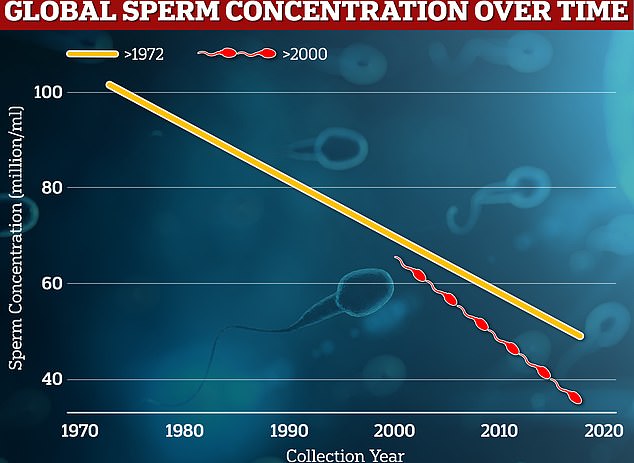Two in five men die young because they don’t take their health seriously – and avoid going to the doctor, experts warn
Thousands of men in the UK die prematurely every week because society fails to take their health seriously, a damning report warns today.
According to the Real Face of Men’s Health report, two in five men (39 percent) die younger than they should, meaning 133,000 men die prematurely each year.
The report found that many people could have been saved by improving access to screening for diseases such as prostate cancer or by breaking down taboos that prevent them from seeking medical care.
Others would have lived longer if they had received help to improve their lifestyle, such as cutting down on alcohol, junk food and smoking – and exercising more.
Men attend fewer health and GP appointments than women, putting them at greater risk of late diagnosis of diseases such as cancer and heart disease.

Internet personality Sam Cornforth and former TOWIE star Pete Wicks have partnered with Movember in preparation for Testicular Cancer Awareness Month in April

The Distinguished Gentleman’s Ride in London raised money and awareness for Movember in May
The charity Movember claims that men’s health has been “relegated to the background” and says its report should be a “wake-up call” to the unacceptable state of men’s healthcare in the UK.
It calls for a specific strategy for men’s health to reverse the decline in male life expectancy and for the appointment of a dedicated national clinical director for men’s health, reflecting the existing role of women.
The report highlights how men’s health in the UK lags behind most other wealthy countries and exposes the devastating impact of the crisis on men and their families.
A boy born in the UK in 2021 can expect to live to be 78.7 years old, four years shorter than a girl.
It is also three years shorter than boys in Switzerland, 2.6 years shorter than boys in Australia and 1.3 years shorter than boys in Ireland.
In England and Wales, suicide is the leading cause of death among men aged 20 to 34. The suicide rate is generally three times higher among men than women.
The report found that men are less likely than women to have healthy lifestyles and are more likely to smoke, drink alcohol, use drugs and have high cholesterol and high blood pressure.
They are also less likely to attend health check-ups and GP check-ups, putting them at greater risk of late diagnosis of diseases such as cancer and heart disease.
A new poll for the research found that two-thirds of men (64 percent) wait more than a week before seeing a doctor for symptoms, while a third (31 percent) wait more than a month.
And when men do seek help, health systems are ill-prepared to provide them with “engaged, appropriate and effective care,” the report says.
Many men (62 percent) indicate that they want to leave their therapist or that they have left a previous therapist because of a lack of ‘personal connection’.
Around 48 per cent think it is normal to avoid medical checks, while less than 40 per cent take up the offer of an NHS health check for which they are eligible.
The report found that men are deterred from seeking help because of ‘stigma’ or ‘traditional male norms’. These norms suggest that they must act like a man and endure pain, or risk being ridiculed by women for having ‘man flu’.
According to Movember, tackling preventable diseases in men could save the UK £9.4 billion by 2023 alone – enough to cover the costs of nine of England’s largest hospitals.
Researchers emphasize that the impact is not only felt by men themselves. Their mostly female partners often have to care for them when they fall ill, and have to stay behind in the grieving process after their death.
Michelle Terry, chief executive of Movember, said: “The report’s findings should serve as a warning about the unacceptable state of men’s health in the UK.
‘For too long, men’s health has been relegated to the sidelines of broader health conversations. Men’s health does not exist in a vacuum.
‘If we want to reduce these tragic numbers and better support the men in our lives, real change is urgently needed.

Graph shows: The rate at which sperm concentration is declining globally, compared to samples collected between 1972 and 2000 (orange) and since 2000 (red).
‘If we are to make real progress, we must invest in education and health system reforms to meet the unique needs of all genders, and develop a specific strategy for men’s health.’
The report found that men living in the ten constituencies with the highest premature death rates were almost 3.5 times more likely to die prematurely than men living in the ten constituencies with the lowest premature death rates.
It says: ‘Twenty years of campaigning for men’s health has taught us that everyone has a story to tell.
‘Stories of men who don’t know their risks. Don’t pay attention to their physical and mental health.
‘Stories of men who are too late to talk to a healthcare provider, or who simply have a bad experience with it.
‘Every day we hear from men themselves, but also from their wives, mothers, sisters, partners, buddies, neighbors, children, teachers and doctors.’
The report adds: ‘This report outlines the state of men’s health in the UK and highlights the benefits that could be delivered to families, communities and societies if we improved men’s health, including billions in savings from preventing avoidable conditions in men and improvements in the daily lives of men and their loved ones.
“Men’s health impacts each and every one of us and we invite policymakers to be part of the story for positive change.”
William Roberts, chief executive of the Royal Society for Public Health, said: ‘Too many men are dying too young and too many men are suffering ill health from preventable conditions.
‘It is vital that we address the underlying causes of poor men’s health. Men’s health affects us all and we must see it as a vital part of a healthy nation.’
A Department of Health and Social Care spokesperson said: ‘This Government’s mission is to get the NHS back on its feet, so that it is available to everyone.
‘We know that men can be reluctant to use health and other support services.
‘Asking for help is not a sign of weakness. We encourage everyone to talk to their GP if they have any concerns about their mental or physical health.
‘Prevention is better than cure. That’s why the focus of healthcare is shifting from treating diseases to supporting people to live longer and healthier lives.’
